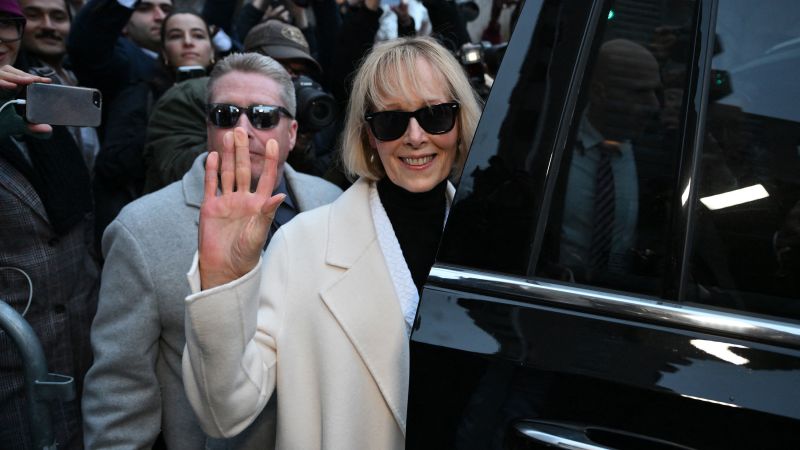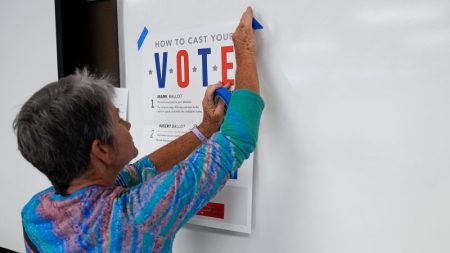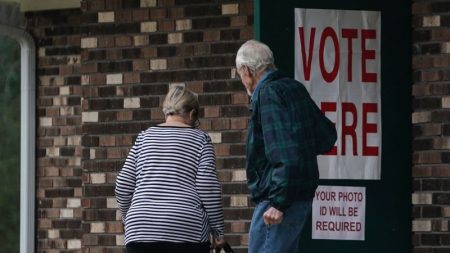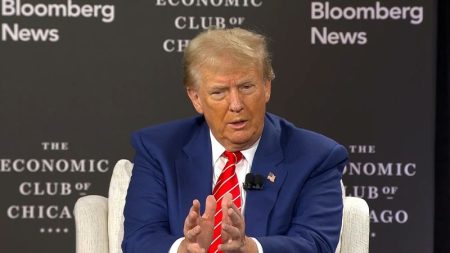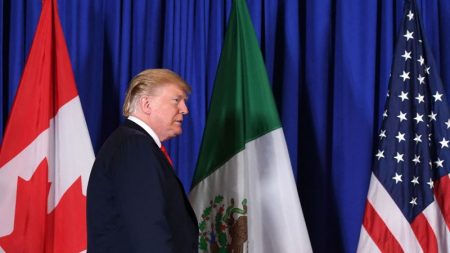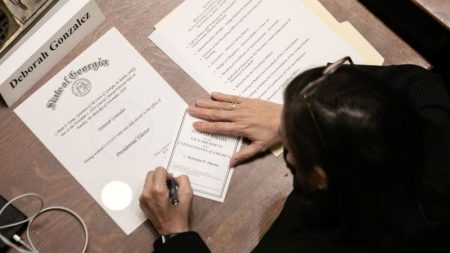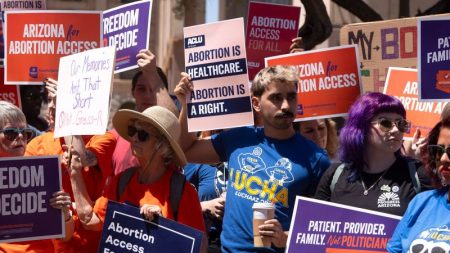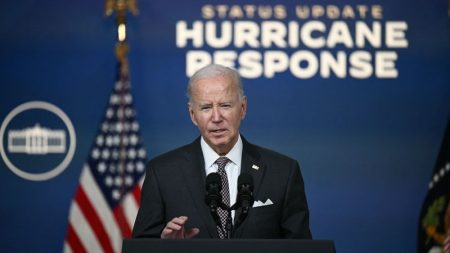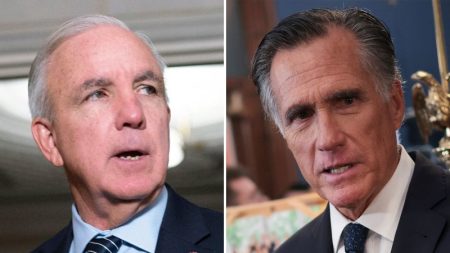A jury said that Donald Trump should pay $83.3 million in damages Friday, an eye-popping sum that marks the sharpest legal setback for a former president now entangled in multiple criminal and civil cases while he campaigns for the White House.
The verdict was the second time over the past year that a jury has awarded E. Jean Carroll millions of dollars in damages from Trump for his defamatory statements disparaging her and denying her rape allegations.
But this verdict was on a whole different scale – awarding $65 million in punitive damages alone and a total dollar figure eight times higher than what Carroll initially sought in her lawsuit.
Friday’s verdict, while sure to be appealed, comes ahead of a judge’s expected decision later this month in Trump’s civil fraud trial that could threaten the former president’s business empire, along with the four criminal indictments that are awaiting trial and a US Supreme Court hearing on whether the front-runner for the Republican presidential nomination can appear on the ballot.
Here are the key takeaways from the defamation trial and verdict:
Over the past year, Trump has railed against the prosecutors who have investigated and charged him, the plaintiffs who have sued him and the judges who have overseen his trials.
But the nine-person jury didn’t blink. It awarded Carroll $18.3 million in compensatory damages. It was the punitive damages, however, that landed Carroll such an astronomical sum: $65 million.
During the trial, Carroll’s lawyers told the jury that Trump should be punished with a large number in damages so that it actually gets him to stop his defamatory behavior.
“The law says you can consider Donald Trump’s wealth as well as his malicious and spiteful continual conduct,” Carroll attorney Roberta Kaplan said. “Billions of dollars is just a drop in the bucket for Trump.”
The verdict is significant not just for the monetary damages, but also for the message it sends that a jury of regular citizens did not believe Trump – not Democratic-appointed prosecutors or judges or the administration of his likely 2024 political opponent, President Joe Biden.
There’s still a long road ahead before Carroll would see the money the jury awarded.
Last year, the jury in the first defamation trial awarded Carroll a total of $5 million in damages – including nearly $3 million for defamation – after finding that Trump sexually abused Carroll and then defamed her in 2022 when he denied the allegations and disparaged her.
That verdict is still being appealed, and Trump within minutes of Friday’s verdict declared he will appeal this one as well.
“Absolutely ridiculous! I fully disagree with both verdicts and will be appealing,” Trump wrote in a post on Truth Social.
Trump set aside $5.5 million to a court-controlled account last year in a step toward satisfying the judgment from the defamation lawsuit, though, Carroll would not have access to the funds until after all appeals, including potentially to the US Supreme Court, are satisfied.
Endless appeals and delays are a familiar tactic for Trump, who is already also appealing a New York state judge’s ruling that he was liable for fraud – and is gearing up to appeal that judge’s ruling in the broader New York attorney general’s civil fraud case that’s coming as soon as next week.
Carroll’s attorney was just minutes into her closing argument Friday when Trump made a decision: He was not going to sit and listen.
The former president got up and walked out of the courtroom in the middle of the closing argument, with adviser Boris Epshteyn following him out, the judge noting for the record that Trump had left the courtroom.
Trump remained outside of court until after the break and it was his attorney Alina Habba’s turn to make her case to the jury.
The walkout was one last act of defiance for a former president during the defamation trial, after he was admonished at several points both for speaking audibly from the defense table and for going beyond the tightly controlled, three-minute testimony he was permitted to give on Thursday.
The restrictions put in place by Judge Lewis Kaplan (no relation to the attorney) provided a far different backdrop compared to Trump’s performance during the civil fraud trial in New York state court. There, Trump was on the witness stand for hours, attacking the trial, the state attorney general and the judge himself while he testified. When he left the courtroom, Trump was able to speak his mind at a waiting camera.
In federal court at the defamation trial, there were no cameras permitted, so Trump was forced to rely on his social media to go after the trial against him.
Trump didn’t stick around for the verdict either – leaving for LaGuardia Airport before the verdict was reached and taking off not long after it had been read.
It didn’t take the jury long to return a verdict against Trump, with deliberations lasting less than three hours.
Carroll’s attorneys argued that they should hit Trump with an “unusually high” amount of punitive damages in order to get him to stop his attacks.
Trump’s statements about Carroll to this day are “dripping with malice, with hate,” Carroll attorney Shawn Crowley said.
Trump’s attorney argued that Carroll would have received hateful messages when she wrote her story no matter what Trump said.
“We have watched six days of a plaintiff trying to pin Twitter trolls comments on a former president of the United States without accepting any responsibility for the media and the press frenzy and the public profile that she wanted and she still enjoys,” Habba argued.
The negative messages should be “universally condemned,” Habba said. “But President Trump should not have to pay for their threats. He does not condone them. He did not direct them. All he did was tell his truth,” Trump’s attorney said.
The jury disagreed.
Judge Kaplan had little patience for Habba or Trump during Friday’s closing arguments, admonishing the former president’s lawyer repeatedly and at one point warning she could spend time “in the lock up.”
The judge’s annoyance with Trump’s attorneys is a pattern that has played out across his two fall civil trials where his lawyers have tried to push the envelope – and is one that’s likely to continue should any of Trump’s criminal cases head to trial this year.
On Friday, when Habba tried to make a record to refute a ruling Kaplan made that the defense could not use a slide in their closing presentation, Kaplan cut her off.
“You are on the verge of spending some time in the lock up, now sit down,” he said to Trump’s attorney.
Once Habba began her closing argument, she quickly ran afoul of Kaplan again, trying to raise Trump’s denials of Carroll’s sexual assault allegations – even though that question is not part of this trial, because a previous jury already found that Carroll proved sexual assault.
Habba told the jury that Trump has “consistently stated his position, as is his American right.”
Kaplan cut her off to again instruct the jury that they must accept that it’s been previously established by a prior jury that Trump sexually assaulted Carroll.
Habba responded, “Yes, it’s been established by a jury.”
“It is established, and you will not quarrel with me,” Kaplan shot back.
Read the full article here



